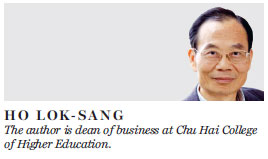Conservationist sale better choice
Updated: 2017-06-20 07:54
(HK Edition)
|
|||||||
Ho Lok-sang says outlets fear they will be stuck with unused tusks when shutdown takes effect in 2021 - strictly controlled non-profit shops could solve the problem
Back in 2014 I wrote a column here advising that confiscated ivory should not be destroyed but should instead be sold through licensed conservationist outlets. I wrote:" (we should) think about appointing specially authorized sales outlets to sell certified ivory seized by customs officers. The revenue collected from this should be used to fight poaching and smuggling... I would suggest that unauthorized points of sales should stay illegal, trade in illegal ivory should remain illegal, and poaching should be heavily penalized."
Following rising public concern about elephant poaching and ivory smuggling, the government has decided to ban the city's ivory trade altogether. Secretary for the Environment Wong Kam-sing announced in December last year that the government would phase out the trade by 2021. A landmark bill to ban ivory trade was launched last Wednesday. Lawmaker Regina Ip Lau Suk-yee asked whether compensation for traders should be paid but Wong said the government would not buy up the ivory as the city was " determined" to close down the market. The same plea was raised by Junius Ho Kwan-yiu in March and was also rejected then.

My 2014 article argued that elephants that have already been killed will not benefit from the destruction of seized smuggled ivory. Neither will they benefit from banning " conservationist ivory sale" - a term I coin for the non-profit sale of " old licensed ivory", the proceeds from which will be set aside for protection of wild elephants. I argued that whatever cruelty involved in the killing of elephants is a done event if the ivory products had already been made or if the raw ivory had been purchased prior to the 1989 ban by the Convention on International Trade in Endangered Species of Wild Fauna and Flora (CITES).
My point is that if we are so concerned about the preservation of wild elephants, we should opt for the most effective policy to protect elephants. Protecting elephants needs funding. We can have licensed " conservationist ivory sale outlets" where certified ivory products can be sold. Since these outlets are not for profit, and the supply is from smuggled ivory and old stock, they will not become a market for poachers. The outlets will generate a stream of revenue that can support the cause of conservation.
Setting up licensed conservationist outlets to sell certified ivory products will also let the sunset industry of ivory carving survive until the stock of raw ivory is all used up. Moreover, the acquisition from currently licensed commercial traders will give these traders a compensation that is well justified because they had done nothing illegal. If they had acquired their ivory stock legally why shouldn't we give them compensation that merely reflects their cost with a zero profit margin. With proper planning and administration this should not cost society anything.
These businessmen have a legitimate complaint that, given the slow sale of products, phasing out the trade by 2021 may not allow sufficient time to dispose of stocks. My recommendation is to negotiate a compensation figure that is reasonable so they will not incur a big write-down on their stocks. Our licensed non-profit outlets will then take over the ivory sale business under strict supervision. There will then be no commercial transaction of ivory so the government's commitment to " close down the market" will not be compromised.
My proposal is that anyone who has bought ivory products from the licensed outlets may only resell to these outlets. Private transactions will remain illegal and punishable by law. The certificates will show the origin of the ivory, and also the name and Identity Card number of the purchaser.
Legislator Elizabeth Quat pointed out that previous attempts to register ivory stocks and allow sales of registered ivory had given the impression that the ban was lifted, and as a result poaching activities regained momentum. I must stress that the earlier failures were due to the nature of the authorized sales. Since the authorized sales then were for-profit, there would be incentives for unscrupulous traders to smuggle illegal ivory and to forge false origins. What I am arguing for is non-commercial sales of ivory products in non-profit outlets.
On the mainland, the pace of legislation to ban ivory trade is even faster. Already almost half of mainland's authorized, government-approved ivory factories and shops were believed to have been closed down. It is expected that " the rest of China's legal trade will be gone by the end of the year - a total of 34 factories and 138 shops", according to a BBC report. If my suggested new approach works, commercial sale of ivory will still be gone but the craftsmen will be able to continue making a living for the time being, and honest businessmen will be able to recoup much of their earlier investment.
(HK Edition 06/20/2017 page8)